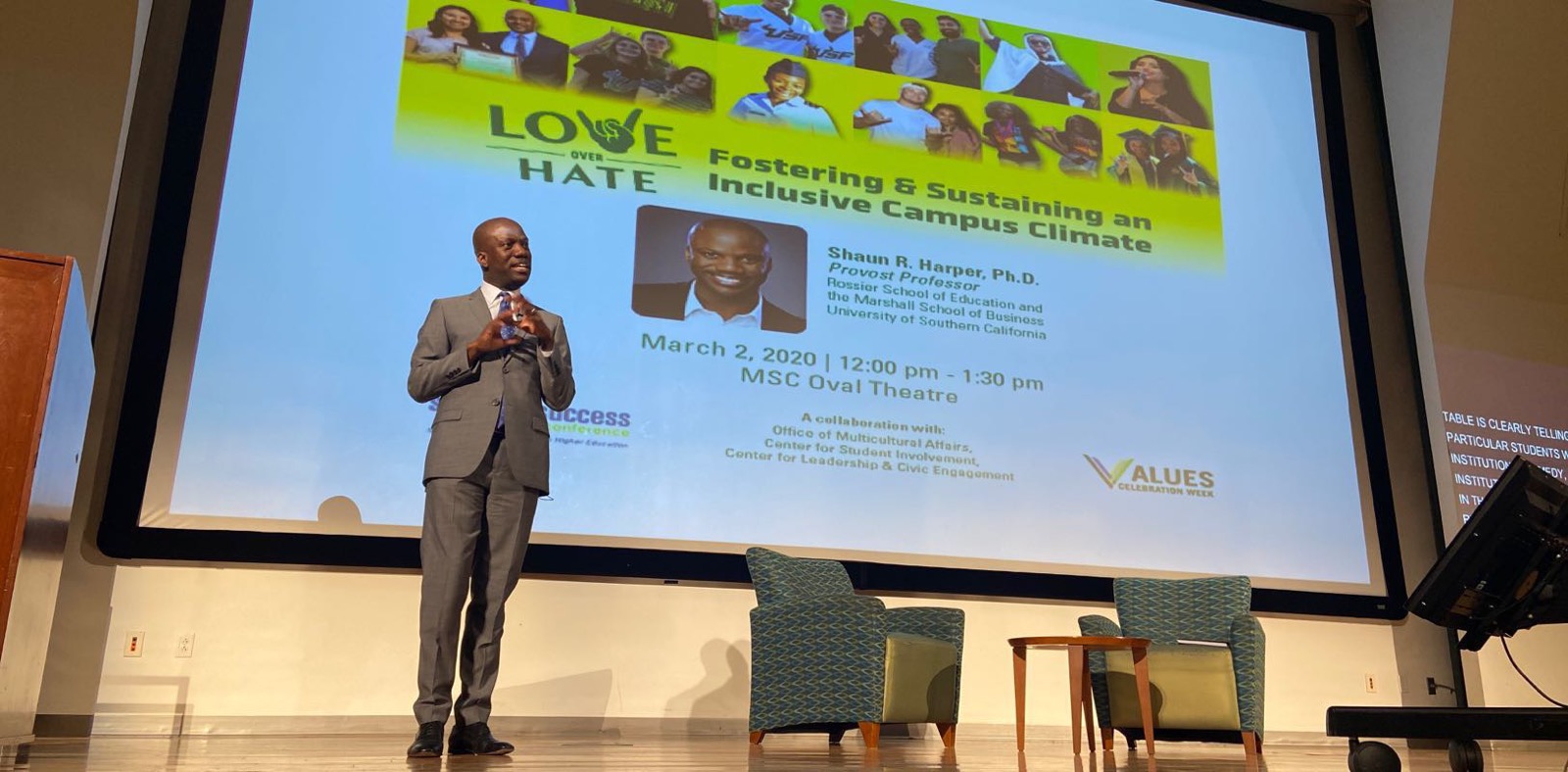Shaun Harper addresses race, equality at ‘Love Over Hate’ lecture

When the “Love Over Hate” program invited Shaun Harper to speak for its Values Celebration Week, it may not have anticipated the blunt critiques he would have.
A professor at the Rossier School of Education and Marshall School of Business at the University of Southern California (USC), Harper has dedicated his career to promoting equality and inclusion in education.
Speaking Monday afternoon in the Marshall Student Center Oval Theater after a keynote speech at the USF-hosted National Student Success Conference, Harper took the stage as the first lecturer in the history of the Love over Hate program.
Sponsored by the Office of Multicultural Affairs, the Center for Student Involvement and the Center for Leadership and Civic Engagement, Harper spoke to about 100 USF students and faculty on how the university can resolve racial issues and promote inclusiveness on campus.
His biggest critique was about the name of the program.
“‘Love over hate’ sounds like a love song,” Harper said.
“[Creating an inclusive campus] requires the people who work here to courageously denounce white supremacy in all of its forms. It requires a not-so-feel-good saying like ‘love over hate.’ That sounds nice. A stronger thing to stick is, ‘hate does not belong here.’”
The audience laughed slightly and nodded their heads in agreement.
After opening a question-and-answer period, a student asked about combating microaggressions on campus. Harper criticized the National Panhellenic Council (NPHC) Plaza, which was established on campus in February 2019.
“My sense is that NPHC Plaza could in fact be a daily microaggression for the members of the NPHC groups who were fighting and demanding and asking and begging and pleading for years and years and years to have space,” Harper said. “Begging and pleading for the space to affirm their belonging, affirm the inclusion of their groups.”
Harper was interrupted by claps from the audience.
The NPHC uses plots in the plaza to symbolize representation of students’ belonging to college and university campuses across the nation, according to the USF website.
The website also said that the plaza was specifically built to represent diverse groups on campus.
“USF is the first non-Historically Black College and University (HBCU) state institution in Florida to build physical representation for this underrepresented population.”
“I don’t know what that space’s current iteration is supposed to do,” Harper said.
Harper has been engaged in research on campus racial climate for the past 16 years.
“That research started for me as an individual faculty member, where I would go to a campus for three to four days and talk to as many focus groups as I could during those three to four days,” Harper said.
The results of his research led to the development of the National Assessment of Collegiate Campus Climates (NACCC), which has been administered to more than half a million college students.
“We took the best of what we’ve learned over all those years of qualitative research to inform the constructs of a national quantitative campus climate survey.”
Harper said that the questions in the survey help determine trends and occurrences on campus.
“We’re asking questions about the campus racial climate,” Harper said. “We’re asking students about the extent to which they are interacting across racial groups with peers from different racial and ethnic groups and where it happens and how it gets initiated. We’re asking them about the inclusiveness of their classroom.”
Through the results of the survey, universities are able to see where they need to improve in regard to inclusiveness and helping students feel safer on campus.
Harper said the next step in combating racism was to address injustices and initiate open conversations as a university.
“You will never achieve racial equity and inclusion across racial and ethnic groups on your campus until and unless you’re able to have some honest conversations about race,” Harper said.
In regard to the importance of sharing this information with college campuses, Harper said it is important to educate college students because they are future policymakers.
“In every sector of the American economy, white people occupy the most significant positions of leadership and authority,” Harper said. “For instance, more than 90 percent of the United States Senate is white, all but three governors of these 50 United States and like 91 percent of Fortune 500 CEOs are white. Eighty-seven percent of college presidents are white. More than 80 percent of K-12 school teachers are white.
“[In the NACC] we are asking them questions around their racial literacy meeting, how prepared are you to talk about race and solve racial problems. So when we’re thinking about climate, we have to also think about the preparation of students for citizenship in a racially diverse democracy after college.”






